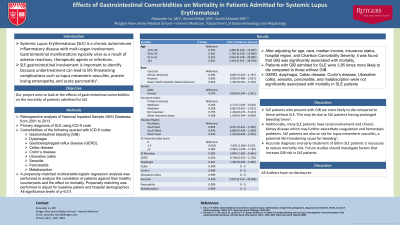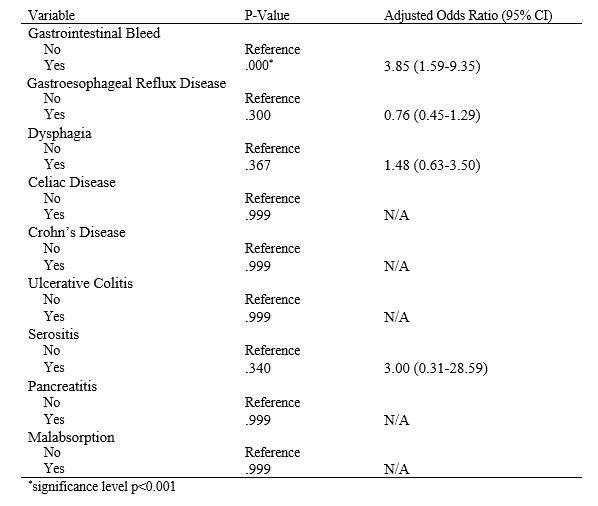Back


Poster Session E - Tuesday Afternoon
Category: GI Bleeding
E0298 - Effects of Gastrointestinal Comorbidities on Mortality in Patients Admitted for Systemic Lupus Erythematosus
Tuesday, October 25, 2022
3:00 PM – 5:00 PM ET
Location: Crown Ballroom

Has Audio

Alexander Le, MD
Rutgers New Jersey Medical School
Newark, NJ
Presenting Author(s)
Alexander Le, MD, Aaron Kahlam, MD, Anmol Mittal, MD, Sushil Ahlawat, MD
Rutgers New Jersey Medical School, Newark, NJ
Introduction: Systemic Lupus Erythematosus (SLE) is a chronic autoimmune inflammatory disease with multi-organ involvement. Gastrointestinal manifestations typically arise as a result of adverse reactions, therapeutic agents or infections. However, SLE gastrointestinal involvement is important to identify because undertreatment can lead to life threatening complications such as lupus mesenteric vasculitis, protein losing enteropathy, and acute pancreatitis. Our project aims to look at the effects of gastrointestinal comorbidities on the mortality of patients admitted for SLE.
Methods: A retrospective analysis of the largest inpatient database, the National Inpatient Sample, was performed from 2001-2013. Primary diagnosis of SLE and comorbidities including gastrointestinal bleeding (GIB), dysphagia, gastroesophageal reflux disease (GERD), Celiac disease, Crohn’s disease, Ulcerative colitis, serositis, pancreatitis, malabsorption was extracted using International Classification of Diseases, Ninth Revision (ICD-9) codes. A propensity-matched multivariable logistic regression analysis was performed to analyze the correlation of patients against their healthy counterparts and the effect on mortality. Propensity matching was performed to adjust for baseline patient and hospital demographics. All significance levels of p< 0.01.
Results: After adjusting for age, race, median income, insurance status, hospital region, and Charlson Comorbidity Severity, it was found that GIB was significantly associated with mortality. Patients with GIB admitted for SLE were 3.85 times more likely to die compared to those without GIB. GERD, dysphagia, Celiac disease, Crohn’s disease, Ulcerative colitis, serositis, pancreatitis, and malabsorption were not significantly associated with mortality in SLE patients.
Discussion: SLE patients who present with GIB are more likely to die compared to those without SLE. This may be due to SLE patients having prolonged bleeding times. Additionally, many SLE patients have renal involvement and chronic kidney disease which may further exacerbate coagulation and hemostasis problems. SLE patients are also at risk for lupus mesenteric vasculitis, a potential life threatening cause for bleeding. Accurate diagnosis and early treatment of GIB in SLE patients is necessary to reduce mortality risk. Future studies should investigate factors that increase GIB risk in SLE patients.

Disclosures:
Alexander Le, MD, Aaron Kahlam, MD, Anmol Mittal, MD, Sushil Ahlawat, MD. E0298 - Effects of Gastrointestinal Comorbidities on Mortality in Patients Admitted for Systemic Lupus Erythematosus, ACG 2022 Annual Scientific Meeting Abstracts. Charlotte, NC: American College of Gastroenterology.
Rutgers New Jersey Medical School, Newark, NJ
Introduction: Systemic Lupus Erythematosus (SLE) is a chronic autoimmune inflammatory disease with multi-organ involvement. Gastrointestinal manifestations typically arise as a result of adverse reactions, therapeutic agents or infections. However, SLE gastrointestinal involvement is important to identify because undertreatment can lead to life threatening complications such as lupus mesenteric vasculitis, protein losing enteropathy, and acute pancreatitis. Our project aims to look at the effects of gastrointestinal comorbidities on the mortality of patients admitted for SLE.
Methods: A retrospective analysis of the largest inpatient database, the National Inpatient Sample, was performed from 2001-2013. Primary diagnosis of SLE and comorbidities including gastrointestinal bleeding (GIB), dysphagia, gastroesophageal reflux disease (GERD), Celiac disease, Crohn’s disease, Ulcerative colitis, serositis, pancreatitis, malabsorption was extracted using International Classification of Diseases, Ninth Revision (ICD-9) codes. A propensity-matched multivariable logistic regression analysis was performed to analyze the correlation of patients against their healthy counterparts and the effect on mortality. Propensity matching was performed to adjust for baseline patient and hospital demographics. All significance levels of p< 0.01.
Results: After adjusting for age, race, median income, insurance status, hospital region, and Charlson Comorbidity Severity, it was found that GIB was significantly associated with mortality. Patients with GIB admitted for SLE were 3.85 times more likely to die compared to those without GIB. GERD, dysphagia, Celiac disease, Crohn’s disease, Ulcerative colitis, serositis, pancreatitis, and malabsorption were not significantly associated with mortality in SLE patients.
Discussion: SLE patients who present with GIB are more likely to die compared to those without SLE. This may be due to SLE patients having prolonged bleeding times. Additionally, many SLE patients have renal involvement and chronic kidney disease which may further exacerbate coagulation and hemostasis problems. SLE patients are also at risk for lupus mesenteric vasculitis, a potential life threatening cause for bleeding. Accurate diagnosis and early treatment of GIB in SLE patients is necessary to reduce mortality risk. Future studies should investigate factors that increase GIB risk in SLE patients.

Figure: Figure 1. Predictors of mortality in patient with SLE and concurrent GI diseases
Disclosures:
Alexander Le indicated no relevant financial relationships.
Aaron Kahlam indicated no relevant financial relationships.
Anmol Mittal indicated no relevant financial relationships.
Sushil Ahlawat indicated no relevant financial relationships.
Alexander Le, MD, Aaron Kahlam, MD, Anmol Mittal, MD, Sushil Ahlawat, MD. E0298 - Effects of Gastrointestinal Comorbidities on Mortality in Patients Admitted for Systemic Lupus Erythematosus, ACG 2022 Annual Scientific Meeting Abstracts. Charlotte, NC: American College of Gastroenterology.
